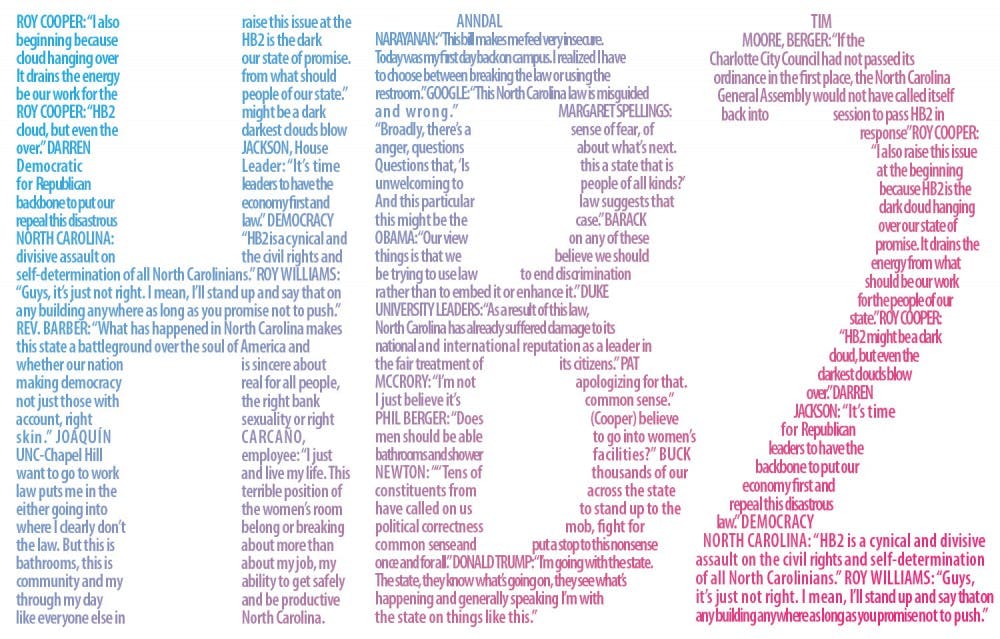“The NBA, NCAA and business leaders have made clear that they prioritize cities like New Orleans, Orlando and Dallas with fully inclusive nondiscrimination protections that ensure the safety of their employees and fans,” the statement said.
House Bill 2 ‘put the nail in the coffin’ on state’s public image
Joaquin Carcaño, a project coordinator at UNC and a plaintiff named on a case against the state said House Bill 2 has severely damaged the state’s reputation.
“Not being a native North Carolinian, moving to North Carolina was definitely kind of a safe place in the South, which is not always the case,” he said. “That’s definitely changed in the past year for a lot of people including myself.”
Carcaño said other states — like Texas and its Senate Bill 6 — have proposed laws similar to House Bill 2.
“North Carolina is still the only one (where) something like this is actually law,” he said.
There have been efforts to craft laws similar to House Bill 2 in South Carolina, Virginia, Tennessee and Texas, Schofield said.
But efforts inspired by House Bill 2 haven’t gotten very far, Schofield said.
“Even Republican governors and state officials said ‘I don’t think we want to deal with that,’” he said. “But Texas seems to be the one state that is plowing ahead in this direction right now.”
Repealing House Bill 2 might help the state’s image, but it wouldn’t solve the issue, Schofield said.
“North Carolina is in the midst of now a six-year, going on seven-year, hard turn to the right in its state public policies, and I think North Carolina was the subject of jokes on late night talk shows and in national media and on the internet even before HB2 and because it has been softened up by all that pre-negative publicity,” he said. “HB2 sort of really put the nail in the coffin. So I think it would take a while to rebuild our image.”
‘It’s increased the fear’
To get the day's news and headlines in your inbox each morning, sign up for our email newsletters.
Terri Phoenix, director of the LGBTQ center at UNC, said there were serious about if and how the law’s bathroom provision would be enforced on UNC campuses.
“There was still some anxiety just around people being worried that others were policing the bathroom, meaning they were judging who had the right or not had a right to be in different bathrooms based on their appearance,” Phoenix said.
Anxiety diminished after a few weeks, when UNC determined it would not enforce the law, and that it would have no effect on the University’s nondiscrimination statement.
Carcaño said House Bill 2 is not just about people being able to use the right facilities.
“It’s increased the fear in the environment,” he said.
House Bill 2’s impact on UNC is causing North Carolina to lose a lot of valuable people, Carcaño said.
He said he’s heard House Bill 2 has affected UNC’s ability to recruit students to some of its programs — and that people have cited the law as creating an environment they do not want to live and study in.
Failed repeal efforts
Repeal efforts against House Bill 2 have been going on in the North Carolina legislature but have not been successful.
Schofield said the most notable repeal effort was House Bill 186, which was designed as a compromise to repeal House Bill 2 — but not very thoroughly.
He also said that on March 14 Democrats in the state House offered an amendment on a state banking law bill that would have simply repealed House Bill 2.
“They’ve introduced legislation to do that and thus far that kind of legislation hasn’t even been allowed a hearing or a discussion,” he said.
Rep. Chuck McGrady, R-Henderson, was a primary sponsor of House Bill 186. He declined to comment on House Bill 2.
Van Duyn said the N.C. Senate would not hear a bill she was going to amend that would have repealed House Bill 2.
“Retribution in this legislature is fierce, but it had to be done,” she said. “... I don’t know how they knew I was going to do it but they arranged it so that I couldn’t.”
Republicans in the Senate have a super majority that gives them a lot of influence, Van Duyn said.
“Out of 50 senators, I only have 15 seats,” she said. “They can do literally anything they want and they refuse to do anything.”
Schofield said the reason House Bill 2 still exists despite the negative impacts it has had on the state is because the proponents of it are true believers.
“They are committed, particularly conservatives on the religious right, to doing whatever they can do to forestall LGBT rights,” he said.
Proponents of the bill don’t believe there is such thing as a transgender person, and they are committed to trying to stop the widespread acceptance of transgender people, Schofield said.
“I really think that’s at the heart of the opposition to the original Charlotte ordinance and the heart of the support that remains for HB2,” he said. “There are some proponents of course who continue to raise this issue of bathroom safety, and I think that’s just been completely debunked.”
state@dailytarheel.com



